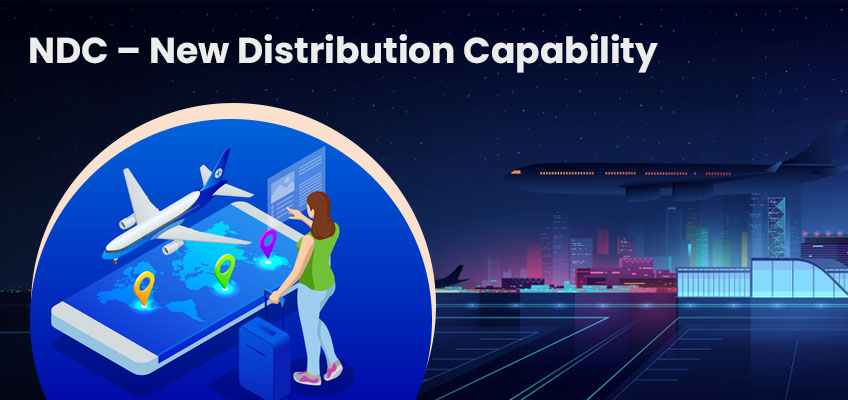Q&A with Lydie Charpin, vice president, customer solutions, corporations, Amadeus
The concept of New distribution capability (NDC) was introduced eight years ago yet development and implementation has been slow. Amadeus’ Lydie Charpin explains why 2022 could see significant steps forward and why IATA changed the way it measures progress.
BTN Europe: How would you describe industry progress on NDC to date? Many would say it’s been a slow journey so far.
Lydie Charpin: It’s been eight years since IATA outlined a vision for the distribution ecosystem. Yes, it does feel like the industry has taken quite some time to put the NDC groundwork in place and, for some time, it appeared that the NDC vision would prove difficult to turn into reality due to the complexity of standardisation and commercial considerations impacting so many different actors. But significant progress has been made in the past years with an increasing number of actors in the whole distribution chain having started their NDC journey.
BTNE: How has the Covid-19 pandemic affected progress?
LC: Despite Covid-19, I’m optimistic that 2022 will be seen as a pivotal year for NDC. We are currently working with more than 30 airlines on the IT side and 17 more to distribute their NDC content through the Amadeus Travel Platform, including IAG, American Airlines, Cathay Pacific and Etihad. Meanwhile, more than 3,500 travel agencies across 57 markets can book this NDC content through our solutions. Our goal is to make NDC-sourced content available to all Amadeus travel sellers globally in the coming months.
BTNE: Explain why the need for NDC is now particularly pressing?
LC: Modern consumers have the same expectations of travel companies as they do of brands such as Amazon, Netflix and Spotify. As an industry, we must improve how we deliver products across all channels and be more responsive to today’s digital consumers. NDC offers new possibilities for the retailing of travel services that better meet these needs. The potential for NDC – together with IATA’s ONE Order initiative – to help airlines and travel companies conceive, retail and deliver end-to-end services more efficiently is an exciting prospect. The future promises a greatly improved traveller experience for the creation of additional value, driven by further industry-wide collaboration. In September, we published a report on NDC containing insights from airlines, corporations and travel sellers. This was designed to shed light on where we are today as an industry in terms of NDC readiness, the barriers that still exist to reach full industrialisation, and show what can be done to accelerate the journey to modern retailing.
BTNE: Why did IATA recently change the way it was measuring progress on NDC implementation?
LC: IATA recently updated the way it measures progress in the adoption of the NDC and ONE Order standards under the Airline Retailing Maturity index (ARMi), for which Amadeus recently was registered both as an airline and travel seller provider. ARMi is the first official industry index that measures the progress in air travel retailing and is structured around three key pillars: capabilities verification, partnership deployment, and a value capture compass.
Ultimately, as an industry, we need to strive towards richer, more tailored, and more relevant travel offers to speed up recovery. We have so far seen some initial successes selling ancillaries and bundles through NDC, but the ability to sell more personalised offers remains mostly untapped. We see this index as a positive development that can accelerate the transition towards this goal.
Amadeus is committed to innovation, cutting edge technology and leadership on NDC and retailing, and being dually registered in the index is another proof point that we are headed in the right direction. We sit at the centre of the travel industry and continue to drive collaboration among all industry players.
Transitioning from the classic and transaction-oriented way of working to a retail-oriented, next-generation environment based on NDC and ONE Order is a sophisticated process that will require a change in mindset and way of working from both airlines and travel sellers. Working together, we can rebuild travel to be bigger and better than ever before and to deliver more value across the whole industry.
BTNE: How is NDC enhancing personalisation?
LC: Corporations can work more closely with airlines to design bespoke offers that cater to their employees – such as special packages for senior managers. This would mean employees don’t have to book and expense such services separately. For example, we spoke to Neil Geurin, managing director of digital customer experience and distribution strategy at American Airlines, who believes NDC delivers what travellers want, more simply. In the aforementioned report, he said: “We know corporate travellers tend to need wifi, and that pretty much every company is happy to fund it. The corporation also likely wins if its senior managers have speedy boarding and a premium cabin seat so they can be more productive. With NDC our corporate customers will be able to work with us to help define their experience with American.”
In practice, NDC makes it easier to provide additional information to corporate travellers: telling them how many frequent flyer points they would earn by booking certain flights, for instance. Such a message can be a powerful driver to comply with travel policy and could mean the corporation unlocks perks like free WiFi or lounge access. Furthermore, personalisation could extend to offering tall passengers a seat with extra legroom or special meals to those who need them. Such tailored offers can be based on travellers’ preferences, historical and real-time data, or the context.
What’s more, this kind of content can be integrated in the same search and booking flow as before via desktop or mobile. This means travellers can conveniently find NDC content, alongside non-NDC content, view and book seats and ancillaries while maintaining the same approval flow.
TMCs, meanwhile, need to help corporations meet their duty of care towards employees, now more than ever, and are experimenting with NDC to access timely data that transfers from booking systems into downstream systems so they can locate every traveller at any moment.
BTNE: How is NDC going to really get off the ground?
LC: While early adopters have seen some initial success with NDC, real acceleration will only happen once we collectively broaden the appeal of NDC. And to do this, collaboration and experimentation are fundamental. Only with mass adoption will we be able to accurately address performance, scalability, and capability requirements. What’s certain is the future of business travel will require greater flexibility, agility and innovation – NDC is forming a core part of this journey as business travel recovers.
Source: BTN Europe






